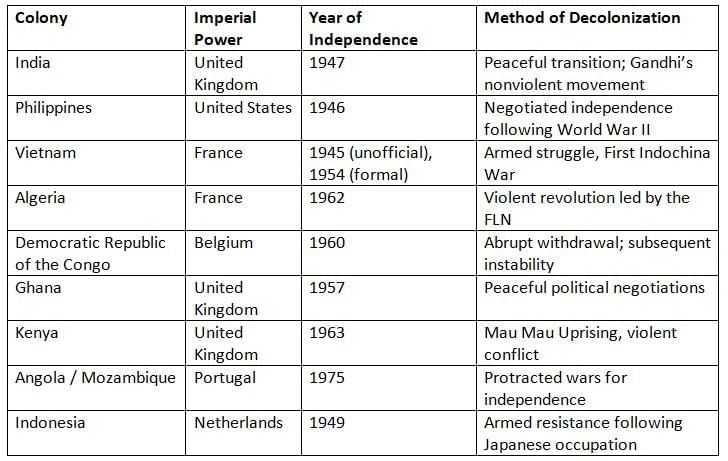Decolonization Chapter Notes | AP European History - Grade 9 PDF Download
Introduction
Throughout the 20th century, European dominance over vast regions of Asia, Africa, and the Middle East waned. Although demands for national self-determination emerged after World War I, widespread decolonization occurred only after World War II, when European nations were financially and militarily depleted. The Cold War further hastened this process, as the United States and Soviet Union supported the dissolution of colonial empires, often to advance their own geopolitical agendas. This chapter notes explores the promise of self-determination, the collapse of empires, and the challenges faced by newly independent nations, highlighting the enduring legacy of imperialism.
The Promise (and Betrayal) of Self-Determination
At the end of World War I, U.S. President Woodrow Wilson’s Fourteen Points championed national self-determination, asserting that peoples had the right to select their own governments. However, this principle was applied inconsistently, with non-European populations often denied independence, particularly in strategically or economically significant areas.
Self-Determination: The concept that a nation has the autonomy to determine its political status without external interference. Post-WWI, colonized peoples anticipated independence, but imperial powers frequently resisted.
Despite rising nationalist movements in Africa and Asia, colonial empires remained largely intact through the 1920s and 1930s. The devastation of World War II was required to initiate their dismantling.
World War II and the Collapse of Empire
After 1945, Europe lacked the resources to sustain extensive colonial territories:
- Economic depletion rendered overseas administration unfeasible.
- Cold War competition prompted new nations to align with either the U.S. or the USSR.
- Anticolonial movements and guerrilla warfare gained strength, often led by World War II veterans.
- Moral pressure from the United Nations and emerging superpowers branded colonization as outdated and contradictory to democratic ideals.
Decolonization: The process through which former colonies achieved independence from imperial rulers, either peacefully via negotiations or violently through revolutions and wars.
Case Studies in Decolonization
Some colonial powers negotiated orderly withdrawals, while others resisted, leading to prolonged conflicts. Below are key examples of decolonization events:
The Role of the Cold War
Decolonization unfolded against the backdrop of Cold War tensions:
- The United States frequently supported anticommunist governments, even if they were authoritarian.
- The Soviet Union endorsed revolutionary and Marxist independence movements.
- Newly independent nations faced pressure to align with one superpower, often hindering genuine self-governance.
Challenges Facing New Nations
While formal colonialism ended, the imprint of imperial rule continued to influence newly sovereign states.
Post-Independence Struggles Included
- Arbitrary borders established by colonial powers, disregarding ethnic, tribal, or religious affiliations.
- Economic reliance on former colonial rulers.
- Civil conflicts and coups stemming from fragile political institutions.
- Neo-colonialism, where European and American corporations maintained dominance over critical resources.
Neo-Colonialism: The practice whereby former colonial powers exerted influence through economic, cultural, and political means, rather than direct rule.
Conclusion
Decolonization fundamentally altered Europe’s relationship with the global community. It dismantled long-standing empires, ignited movements for national identity, and established a new international order. Yet, independence did not ensure stability or prosperity, as many former colonies continue to confront the enduring effects of colonial legacies.
Key Terms
- Cold War Tensions: The geopolitical and ideological rivalry between the U.S. and Soviet Union from post-World War II to 1991, characterized by proxy wars and global influence struggles, significantly shaping decolonization.
- Decolonization: The process by which colonies achieved independence from imperial powers, driven by nationalist movements and post-World War II shifts, leading to profound political and social transformations.
- Democratic Republic of the Congo - 1960: The DRC gained independence from Belgium in 1960, marked by immediate political chaos, ethnic conflicts, and power struggles, reflecting broader decolonization challenges.
- Economic Decline: A sustained reduction in economic activity, such as falling GDP and rising unemployment, impacting post-colonial states and contributing to instability during decolonization.
- Fourteen Points: Woodrow Wilson’s 1918 principles for post-World War I peace, advocating self-determination and international cooperation, influencing early 20th-century independence movements.
- Imperialist States: Nations that expanded influence through colonization or economic dominance, whose decline after World War II facilitated global decolonization.
- India - 1947: India’s independence from British rule in 1947, a pivotal moment in decolonization, driven by nonviolent resistance and nationalist movements.
- Internal Instability: Political, social, and economic turmoil within newly independent nations, often exacerbated by colonial legacies like arbitrary borders and weak governance.
- President Woodrow Wilson: U.S. President (1913–1921) who promoted self-determination through his Fourteen Points, influencing post-World War I nationalist aspirations.
- Renaissance: A 14th-century European cultural and intellectual movement, marking the transition to modernity, indirectly shaping later colonial and decolonial dynamics.
- Self-Determination: The right of peoples to choose their political status, a key driver of 20th-century decolonization despite initial resistance from imperial powers.
FAQs on Decolonization Chapter Notes - AP European History - Grade 9
| 1. What is self-determination and why is it significant in the context of decolonization? |  |
| 2. How did World War II influence the process of decolonization? |  |
| 3. What role did the Cold War play in the decolonization process? |  |
| 4. What challenges did newly independent nations face after decolonization? |  |
| 5. Can you provide examples of case studies in decolonization? |  |




















